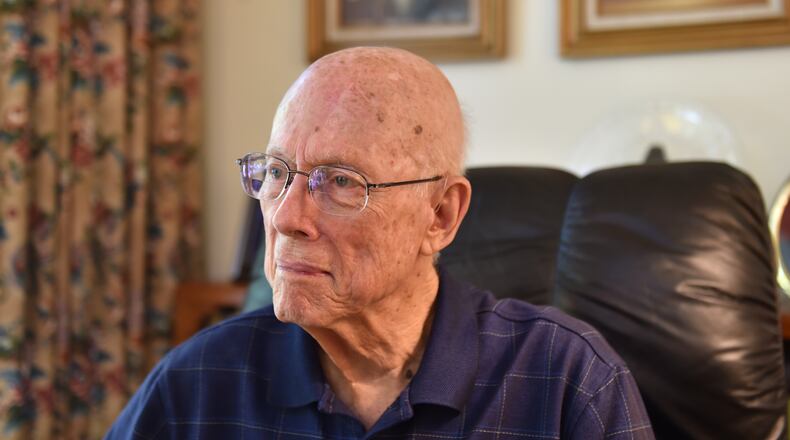BILL MONTGOMERY
Age: 89
Residence: Decatur
Service: U.S. Marines, 5th Division, 26th Regiment, 2nd Battalion
A replica of the famous photo of five Marines and a Navy corpsman raising the U.S. flag on Iwo Jima’s Mount Suribachi on Feb. 23, 1945, sits in Bill Montgomery’s apartment. The photo also adorns a biography he wrote in 2000 about his time on the Pacific island.
He saw the real thing that day from not too far away, a brief moment of respite during a month of hellish combat.
“I turned around and looked up at the top of the mountain. I wondered how they were doing. And as I looked, the flag went up. That was a good feeling because we thought the battle was over. But it was just beginning.”
Montgomery, part of the U.S. Marines’ 5th Division during World War II, spent those first five furious days and then 32 more on Iwo Jima fighting stiff Japanese opposition. According to the pre-invasion report, it wasn’t supposed to be that difficult.
“They said, ‘It’s well-fortified, but our bombers and the big guns from the destroyers and battleships have been bombarding it pretty heavily. So we expect that there’ll be little resistance there. We’ll probably finish the operation in about three days.’ Nothing turned out that way.”
As hard as it might be to believe, Montgomery cherished his opportunity to be in such a battle. He had dreamed of being a Marine since his uncle and mentor, Collins Cooper, was shot down and killed during a bombing run in the South Pacific while Montgomery was still in high school.
So two days after he graduated in Jackson, Miss., Montgomery volunteered. Two days later, on June 6, 1944, he was aboard a train bound for boot camp in San Diego.
“Most of us had grown up reading about war. Ever since (Adolf) Hitler invaded Poland in 1939, the intensity of war just kept building up. Most of us expected the U.S. to be in the war eventually. In fact, I was afraid the war would be over before I had a chance to join the Marines and fight the Japs. You don’t find that attitude too much these days.”
Not only did Montgomery want to be a Marine, he wanted to be a scout sniper. After attending scout sniper school, he was placed in the intelligence section of the 2nd Battalion and assigned to a forward observation unit. Montgomery’s job was to obtain information about the enemy and also serve as an infantryman.
Once they landed on Iwo Jima, those plans changed. Montgomery’s unit advanced as part of the second wave of Americans, sometime around noon.
“I was one of the very few who landed on the first day that wasn’t hit. I don’t know why. All my buddies were hit or killed.”
The intense fighting raged for three weeks. The Americans and Japanese sustained thousands of casualties.
“All of us assumed and expected to be hit. Everybody else was being hit. And our hope was it wouldn’t be fatal. Being 18 helped because few of the real young guys cracked up. That’s combat fatigue. Several times I came across men sitting on the ground, and they were usually the older guys, sobbing their heart out, shaking all over. They had just reached the point where they cracked. … That was one of the saddest things of the battle.”
By Day 5, Montgomery was the only surviving member of his three-man forward observation unit. With little need for those services at that point, he was reassigned to a rifle company.
He remembers the nights being the most dangerous time, when he and his fellow Marines feared a surprise Japanese attack.
“I was terrified many times. Shells crashing all around you. And in fact, some shells so close they could knock you off your feet. Other guys were hit with shrapnel; I was never hit. You just don’t know. I had the attitude, since everybody was being hit, why wasn’t I hit? I felt a little guilty.”
One close call – Montgomery estimated he had about “800 near-misses” during his time on Iwo Jima – came after he was relieved of guard duty at a command post one night about midnight. He went searching for a foxhole to get some sleep and came across one just big enough for the two Marines who had already settled in for the night. So Montgomery made his way to a slit trench a few feet away. It wasn’t even big enough for his rifle, so he left it on the side of the hole and eventually dozed off.
“About an hour or so later, all hell broke loose. Guns firing, explosions and so forth. I couldn’t raise up because the guys right next to me were firing over my head. I couldn’t even reach my rifle. There were explosions all around my foxhole. Then things quieted down in a little while, and the next morning I raised up and the guys next to me were shocked, they were astounded. They thought I was dead.”
The hand grenades the Japanese were throwing had somehow missed him. He had survived yet another battle without a scratch.
After 37 days on an island he had never heard of when he joined the Marines, Montgomery headed back to Hawaii and began intensive training for a potential invasion of Japan’s mainland. He was not aware of when his unit might leave for that assault, or where they might land, but he knew they would be among the first to arrive and likely would suffer immense casualties.
Then, on Aug. 6, news arrived that changed everything.
“I heard one morning that the word was out that our planes had dropped some kind of super bomb on Japan. Big news. And then we kind of pondered that, and three days later another city was hit with another super bomb. We didn’t have a name for it.”
The atomic bombs dropped on Hiroshima and Nagasaki forced the Japanese to surrender. Less than a month later, they made it official.
“What a great feeling. It’s all over. We wouldn’t have to invade Japan. We could go home.”
As for his thoughts on the decision to drop the bombs, Montgomery made a poignant prediction.
“People thought it was a terrible thing to drop the bombs on Hiroshima and Nagasaki, but if we hadn’t dropped the bombs, I’m sure I wouldn’t be here.”
He spent the next nine months on occupation duty in Japan, then opted not to re-enlist and headed for home in July 1946.
“What a tremendous feeling of elation. You made it through.”
After the war: Since his family had moved to Virginia during the war, Montgomery began his new life there. He graduated from the University of Richmond and entered the group insurance business. For 38 years, that line of work took him to Detroit, Chicago, Tampa, Miami, Sandy Springs, back to Chicago and finally to Jacksonville, where he retired in 1990. He and his wife moved to Decatur almost two years ago to be closer to family.
About the Author
Keep Reading
The Latest
Featured



